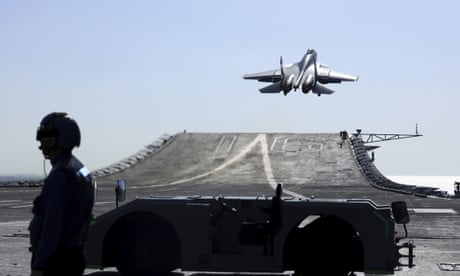- by foxnews
- 17 Mar 2025
China accuses Australia and Canada of ‘disinformation’ over jet encounters
China accuses Australia and Canada of ‘disinformation’ over jet encounters
- by theguardian
- 08 Jun 2022
- in news

Beijing has accused Australia and Canada of "spreading disinformation" over allegedly dangerous manoeuvres by Chinese military pilots in international airspace.
China also warned Australia to stop "provocations" or face "serious consequences" after the Albanese government said a Chinese jet intercepted an RAAF plane in a dangerous manoeuvre in late May.
A day earlier Justin Trudeau hit out at "irresponsible and provocative" actions by Beijing's air force after Canadian aircraft deployed in Japan narrowly avoided a collision with Chinese jets late last month.
The incident has again heightened tensions between Beijing and Ottawa, just as a lengthy crisis over Canada's 2018 arrest of a Chinese tech executive subsides.
China responded to the Canadian prime minister's comments by calling on Canada to "respect the facts [and] stop spreading disinformation".
"Canadian fighter jets' enemy reconnaissance of China is out-and-out irresponsible and provocative behaviour," said a foreign ministry spokesman, Zhao Lijian, at a press briefing on Tuesday.
"China resolutely opposes actions that threaten China's state sovereignty and security under any pretext."
The Canadian aircraft were deployed in Japan for a multinational effort to enforce United Nations sanctions against North Korea over its nuclear weapons and ballistic missile programmes.
They were forced to quickly modify their flight path to "avoid a potential collision with the intercepting aircraft", the Canadian military said.
In a separate row, Australia claimed last week that Chinese fighter planes intercepted one of its jets over the South China Sea during a routine operation.
Australia argued it is not unusual for it to undertake surveillance flights over the strategic waterway, which Beijing insists comes under its domain despite a 2016 Hague ruling that dismissed its claim.
But China said earlier on Tuesday that an Australian P-8A anti-submarine patrol aircraft came near the airspace of the disputed Paracel Islands - known as Xisha in China - on 26 May.
The aircraft "approached for reconnaissance, ignoring repeated warnings from the Chinese side", said a defence ministry spokesman, Tan Kefei.
The People's Liberation Army organised naval and air forces to identify the military aircraft, "issuing a warning to drive it away", Tan added.
"The Australian military plane seriously threatened China's sovereignty and security, and the measures taken by the Chinese military were professional, safe, reasonable and legal," he said.
Tan accused Australia of spreading "false information" and called the actions of the Australian pilots "dangerous and provocative".
The Australian government published a statement on Sunday saying that on 26 May an "RAAF P-8 maritime surveillance aircraft was intercepted by a Chinese J-16 fighter aircraft during a routine maritime surveillance activity in international airspace in the South China Sea region".
The statement added: "The intercept resulted in a dangerous manoeuvre which posed a safety threat to the P-8 aircraft and its crew."
The defence minister, Richard Marles, did not reveal the exact location of the incident at the time or exactly how close the planes came to each other - but he did outline further details at a press conference.
"What occurred was that the J-16 aircraft flew very close to the side of the P-8 maritime surveillance aircraft," he said.
"In flying close to the side, it released flares, the J-16 then accelerated and cut across the nose of the P-8, settling in front of the P-8 at very close distance. At that moment, it then released a bundle of chaff which contains small pieces of aluminium, some of which were ingested into the engine of the P-8 aircraft. Quite obviously, this is very dangerous."
In February Canberra accused the Chinese military of shining a military-grade laser at one of its defence planes over waters north of Australia, labelling it an "act of intimidation".
- by foxnews
- descember 09, 2016
Rare artifacts representing America's 250th birthday will be featured in major exhibition
Rare artifacts will be featured in the "Give Me Liberty" exhibit at the Virginia Museum of History & Culture in Richmond to commemorate America's upcoming 250th anniversary.
read more


